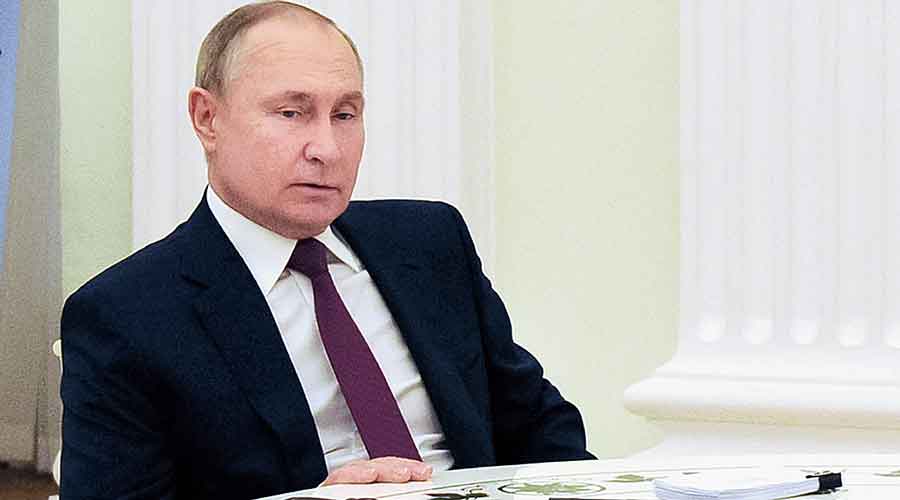In his speech to the Russian nation on Monday, President Vladimir V. Putin buoyed his case for codifying the cleavage of two rebel territories from Ukraine by arguing that the very idea of Ukrainian statehood was a fiction.
With a conviction of an authoritarian unburdened by historical nuance, Putin declared Ukraine an invention of the Bolshevik revolutionary leader, Vladimir Lenin, who he said had mistakenly endowed Ukraine with a sense of statehood by allowing it autonomy within the newly created Soviet state.
“Modern Ukraine was entirely and fully created by Russia, more specifically the Bolshevik, communist Russia,” Putin said. “This process began practically immediately after the 1917 revolution, and moreover Lenin and his associates did it in the sloppiest way in relation to Russia — by dividing, tearing from her pieces of her own historical territory.”
As a misreading of history, it was extreme even by the standards of Putin, a former KGB officer who has declared the Soviet Union’s collapse the greatest geopolitical catastrophe of the 20th century.
Ukraine and Russia share roots stretching back to the first Slavic state, Kievan Rus, a medieval empire founded by Vikings in the 9th century.
But the historical reality of Ukraine is complicated, a thousand-year history of changing religions, borders and peoples. The capital, Kiev, was established hundreds of years before Moscow, and both Russians and Ukrainians claim it as a birthplace of their modern cultures, religion and language.
Kiev was ideally situated along the trade routes that developed in the ninth and 10th centuries, and flourished only to see its economic influence diminish as trade shifted elsewhere. The many conquests by warring factions and Ukraine’s diverse geography — with farmland, forests and a maritime environment on the Black Sea — created a complex fabric of multiethnic states.
The history and culture of Russia and Ukraine are indeed intertwined — they share the same Orthodox Christian religion, and their languages, customs and national cuisines are related.
Even so, Ukrainian identity politics and nationalism have been irritants in Russia since the feudal czarist times that predated the Russian Revolution. Ukraine is seen by many Russians as their nation’s “little brother” and should behave accordingly.
Eastern Ukraine, which came under Russian influence much earlier than the west, still features many Russian speakers and people loyal to Moscow. But the happy brotherhood of nations that Putin likes to paint, with Ukraine fitted snugly into the fabric of a greater Russia, is dubious.
Parts of modern-day Ukraine did indeed reside for centuries within the Russian empire. But other parts in the west fell under the jurisdiction of the Austro-Hungarian empire, Poland or Lithuania.
“Putin’s argument today that Ukraine is historically subsumed by Russia is just not right,” said Cliff Kupchan, chairman of the Eurasia Group, a political risk consulting organisation.
While the themes of Putin’s speech were not new for the Russian leader, Kupchan said, “the breadth and vehemence with which he went after all things Ukrainian was remarkable”.
The newly created Soviet government under Lenin that drew so much of Putin’s scorn on Monday would eventually crush the nascent independent Ukrainian state. During the Soviet era, the Ukrainian language was banished from schools and its culture was permitted to exist only as a cartoonish caricature of dancing Cossacks in puffy pants.
Putin also argued on Monday that the myth of Ukraine was reinforced by the crumbling Soviet government of Mikhail Gorbachev, which allowed Ukraine to slip free of Moscow’s grasp. It was a weakened Moscow that “gave” Ukraine the right to become independent of the Soviet Union “without any terms and conditions.”
“This is just madness,” he said.
It was not Moscow that granted Ukraine’s independence in 1991, but the Ukrainian people, who voted resoundingly to leave the Soviet Union in a democratic referendum.
Now, with an estimated 190,000 Russian troops now surrounding Ukraine like a sickle, Putin’s declaration that Ukraine’s very existence as a sovereign state was the result of historical error threatened to send a shudder through all the lands once under Moscow’s dominion. It also elicited expressions of contempt from Ukrainians.
“For the past few decades, the West has been looking for fascism anywhere, but not where it was most,” said Maria Tomak, an activist involved in supporting people from Crimea, a Ukrainian territory Putin annexed in 2014. “Now it is so obvious that it burns the eyes. Maybe this will finally make the West start to sober up about Russia.”
It is not clear whether Putin believes his version of Ukrainian history or has simply concocted a cynical mythology to justify whatever action he plans next.
But his contention that Ukraine exists solely within the context of Russian history and culture is one he has deployed at least as far back as 2008, when he attempted to convince George W. Bush, who had expressed support for Ukraine’s Nato’s membership, of the country’s non-existence.
Last summer, Putin published a 5,300-word essay that expounded on many of the themes he highlighted in Monday’s speech, including the idea that nefarious western nations had somehow corrupted Ukraine, leading it away from its rightful place within a greater Russian sphere through what he called a “forced change of identity.”
Few observers, though, believe that historical accuracy is of much importance to Putin as he sets forth justifications for whatever he has planned for Ukraine.
(New York Times News Service)











